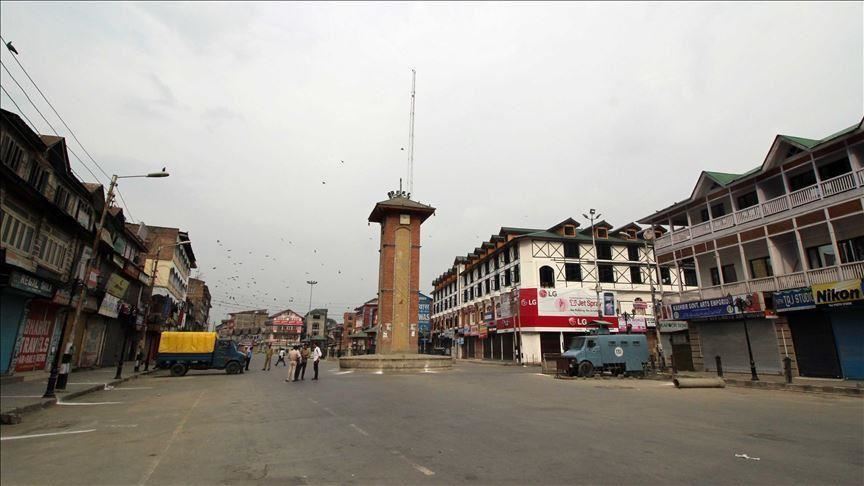India’s move sans Kashmir assembly’s say ‘illegal’: Expert
Special status cannot be stripped without concurrence of elected Kashmir government, says constitution expert

ANKARA
Prime Minister Narendra Modi-led government's recent act of abrogating the special status to Jammu and Kashmir is “illegal” and equivalent to “committing a fraud”, said a top constitutional expert in India.
Speaking to Anadolu Agency from his home in India’s commercial capital Mumbai, A.G. Noorani, author and an expert on Jammu and Kashmir affairs, said the task has already begun to challenge the act in the Supreme Court.
But he expressed skepticism about the period and time the apex court may take to decide about the legality of the government decision.
On Monday, the Indian government stunned the world by revoking nearly all provisions of Article 370 of its constitution that guaranteed a special status to Jammu and Kashmir and helped protect its Muslim character in a Hindu majority country. The provision also defined region’s complex relationship with India.
Author of many books on Kashmir -- including an internationally acclaimed scholarly work, titled Article 370: A Constitutional History of Jammu and Kashmir -- the veteran legal expert said the government decision was “utterly and palpably unconstitutional”.
He said the Indian Supreme Court for sake of its credibility must strike the decision down as void.
'Threat to Kashmiris'
Noorani felt that the repeal of special provisions have posed an existential threat to Kashmiri population.
The legal expert said that the Indian government’s power to abrogate Article 370 had vanished after the dissolution of Kashmiri’s Constituent Assembly in 1956.
“Article 370 was meant to express the identity of Jammu and Kashmir, because of the special circumstances, in which it acceded to India. And that identity is sought to be destroyed. It got a special status because of the historical circumstances,” he explained.
The author also said that by removing this provision, the Hindu nationalist government was not aiming at unifying Kashmir with India, but removing identity of Kashmiri people.
In legal terms, Noorani said, the Indian parliament was not empowered to either amend or delete the provision.
“For this, the approval of the [J&K] State’s Constituent Assembly was necessary. Any concurrence of the state government is always subject to the elected assembly’s final approval. When the state is under governor’s rule or president’s rule, neither can accord that concurrence,” he said.
Explaining further, the constitutional expert on Jammu and Kashmir affairs explained that the central government cannot acquire concurrence from its handpicked appointee.
“Currently, Jammu and Kashmir is under central rule. There is no elected government now,” he said.
He further said that the Indian constitution has itself defined that the state government mean a council of ministers in the state.
“There was no such council of ministers headed by a chief minister right now,” he added.
Precedent
Referring to a judgement by the Supreme Court of Sri Lanka delivered in Nov. 2012 in which it reversed a central government’s order that had been passed without ratification by the provincial council, the author said: "It aptly applies to current situation in Kashmir."
The Divineguma Bill was challenged before the Supreme Court through several petitions. In absence of a provincial council in Northern Sri Lanka, the governor had ratified the law on behalf of the Northern Province.
“This was immediately challenged by the Tamil National Alliance before the Supreme Court through two petitions. On Nov. 1, the Supreme Court held that the governor cannot ratify the legislation, in place of the provincial council,” said Noorani.
'Kashmir for Kashmiris slogan’
Much before India’s freedom in 1947, Hindu ruler of Kashmir Hari Singh had issued an order, imposing a ban on “foreign nationals” in respect of citizenship and purchase of immoveable property and seeking employment in state government.
In a notification of April 20, 1927, Singh had defined “State Subjects”. The law was later incorporated in both Kashmir and Indian constitution.
The law was passed in response to an agitation by Kashmiri Hindus called "Pandits", who raised slogan “Kashmir for Kashmiris” as outsider Punjabi Muslims were dominating in administration and buying land. Now, a century later the Kashmiri Muslims are having similar fears that Hindus had in 1920s.
In 1920s, Hindus even forced the ruler to add a provision that in case a Kashmiri woman married a non-Kashmiri, she will forfeit right to inheritance.
Historian Pandit Prem Nath Bazaz records in his book ''Inside Kashmir'' that the cry of “down with the outsider” was raised by the Kashmiri Pandits.
Muslims had no say, as they were excluded from state jobs by the Hindu ruler and they were too poor to own lands.
“The poverty of the Muslim masses was appalling. Dressed in rags which could hardly hide his body and barefooted, a Muslim peasant presented the appearance rather of a starving beggar than of one who filled the coffers of the state,” wrote the noted historian.
He said the ruler’s order at once stopped the recruitment of the Punjabis in the services.
“With Hari Singh’s pro-Dogra Hindu policy in operation, the people of Jammu, particularly Rajput Hindus, got the most of the big jobs while the Pandits were recruited as clerks in offices vacated by the Punjabis. Needless to say that the Muslims were as yet out of the picture,” Bazaz wrote.
Over past 70 years now, the spread of education and avenues have led Kashmiri Muslims to claim jobs and posts, edging out their Pandit counterparts.
“So a decree that was meant for someone became a blessing in disguise for other and thus became a thorn in the eye,” writes a Kashmiri scholar Hurrair Ashraf.
Anadolu Agency website contains only a portion of the news stories offered to subscribers in the AA News Broadcasting System (HAS), and in summarized form. Please contact us for subscription options.






